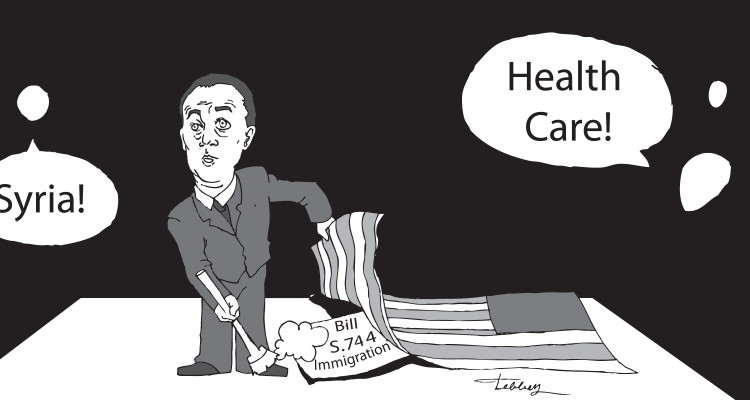Cartoon by Tebben Gill Lopez
In September, President Obama reached a compromise with Russia on Syria’s chemical weapons. October focused on tension in Congress regarding the federal budget that resulted in a piece of kick-the-can legislation rather than solving our ultimate gridlock. This month, the media has focused on a serious flaw in President Obama’s health care plan.
While all of these stories are newsworthy, one issue has evaded major coverage: immigration reform. The American Dream may not be as prominent as it once was, but it can still be argued that this nation offers significant economic opportunity for the immigrant worker. My family was given the chance to come to this country in pursuit of a better life, and I believe that this American tradition should continue.
This was once a major headline, but suddenly all is quiet on the D.C. front. What happened?
One month after his second inauguration, Obama called for Congress to remedy the broken immigration system through his State of the Union Address. The bipartisan Gang of Eight published the “Border Security, Economic Opportunity, and Immigration Modernization Act,” otherwise known as S. 744, on April 16. Debate ensued, leading to the Senate approval on June 27 with a 68-32 vote. According to Ed O’Keefe of The Washington Post, the $50 billion budget aims to strengthen border security, incorporate a responsible pathway to citizenship, and address the broken system.
The most recent action on S. 744 was its introduction to the House of Representatives on Oct. 8 as H.R. 15. A bipartisan group of Representatives has worked on immigration reform over the past year, but recently they hit a snag in negotiation.
Despite its 190 cosponsors, the House leadership will not address the bill in 2013. House Speaker John Boehner claims to understand the importance of immigration legislation, but he recently stated that he has “no intention of ever going to conference on the Senate bill.” The Speaker explained that he does not want to draw attention away from health care and the federal budget.
But if not now – when? Moving slowly on this issue moves us near the midterm elections, making it unlikely that either party will want to vote on such a volatile issue while the voters are paying close attention. Even if this bill were to return to the 114th Congress, it is unlikely to pass because it will be President Obama’s lame duck session. Republicans will stall on major legislation in the hope of reclaiming the White House in 2016. The longer we wait, the more unlikely it is that this reform package becomes a law.
The Speaker’s decision is strategic because the House Republicans are a fragile group. Soon after S. 744 passed through the Senate, the Speaker noted that for “any legislation … to pass the House, it’s going to have to be a bill that has the support of the majority of our members.” To introduce such a contentious bill could only further fracture the majority as they head into a difficult debate on the budget.
Boehner’s decision is standard practice in political hardball, but it has real consequences for those who await its life altering effects.
If this bill does not pass into law, millions of families will continue to be separated from their loved ones. Children will be forced to endure the absence of a mother or father because their parents hope to lift the family out of poverty.
This bill provides a future for our estimated 1.4 million undocumented peers who were brought to this country as innocents. Presently, the system strips them of their humanity for someone else’s decision to enter America.
Boehner must move the House on comprehensive reform because the window of opportunity is closing, but more importantly because it has the ability to change so many lives. I believe Speaker Boehner needs a push on immigration reform from the American people, and that begins with this story getting back in the headlines.
Let’s not sweep immigration under the rug.


Leave a Reply